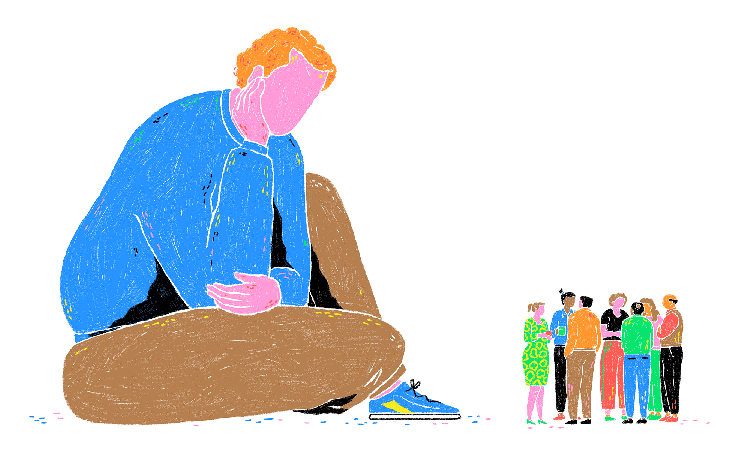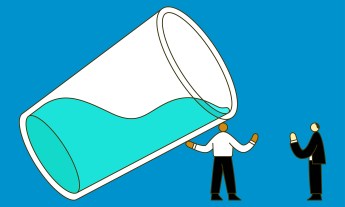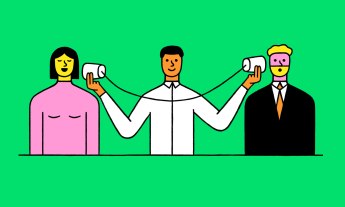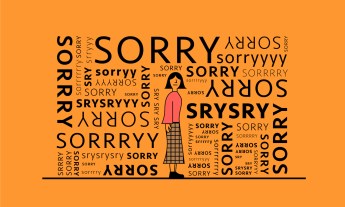
This post is part of TED’s “How to Be a Better Human” series, each of which contains a piece of helpful advice from people in the TED community; browse through all the posts here.
Let’s say I’m driving really slowly because I’m trying to find a specific address. So the person in the car behind me starts honking and flashing their headlights at me.
How do I respond?
I take it personally.
I know I shouldn’t. But it just happens.
Or, let’s say someone cancels a work-related appointment with me at the last minute.
How do I respond?
Again, I take it personally, even though it’s professional. I feel I must not be important enough to them.
I give keynote speeches for a living, and I really like drawing my audience into my story. But the very moment that I see someone not paying attention and look at their phone, I take it personally.
Of course, I’m not the only person who takes these kinds of things personally.
Imagine you invite a friend to the movies and she replies: “Oh sorry, I have to work.” But then you see her on social media having dinner with friends that very night.
Or imagine you worked hard on a project, you’re really proud of the end result, but the only feedback you get is criticism. So you come home and want to share this terrible experience. But while you’re telling your story, your partner walks away to switch on the TV.
Most of us would take these situations personally — we’d feel hurt, neglected, offended or betrayed by the other person.
At these moments, we believe: “It’s the other person’s fault; they’re responsible for what I feel; they’re the one to blame.”
The part of us that’s speaking is our ego. Our ego thinks others should take us into consideration. Our ego doesn’t want to be criticized. Our ego wants to be acknowledged and told we’re always right.
When our egos take over, it’s exhausting.
Instead, it would probably be easier for us if we could stop taking things so personally. That way, no one has power over us; we’re free. We’d experience more harmony and connection between us and others, and our energy could go towards positive things, instead of endlessly battling against the things that drive us crazy.
Well, how do we do that?
Here are some strategies that I’ve come up with.
Strategy #1: Realize that it’s not about you
When I take things personally, I’m always convinced that their actions are about me. When I see someone looking at his phone when I’m speaking, I feel offended and think, “Hey I’ve put so much effort and time in this presentation. I want respect.”
But in fact, it isn’t about me. What if I try to look at it from the other person’s perspective and ask myself: “Why is he or she looking at his or her phone?”
Maybe she’s just received an important message, one she’s been waiting for. Perhaps the topic of my presentation is not really his cup of tea, or, on the contrary, she finds it so interesting that she wants to take notes on her phone.
By shifting my focus from “me” to “we”, I won’t take it so personally. If I try to see the intention of the other person, I make space for understanding rather than irritation.
When you put your son to bed and he doesn’t want you to and he throws himself on the floor and screams, “I hate you,” do you take that personally?
Probably not, because you know it’s not about you; it’s about what he wants and needs. He’s angry because he just wants to stay up a bit longer; that’s all.
Whenever you start to take things personally, look at the other person’s intention. Of course, this seems simple … in theory. In real life, it turns out to be a heck of a job. When you see two colleagues talk to each other, look at you and start laughing, do you think: “Oh, they must have noticed my new shoes and I want them too?”
No. You think, “They’re laughing at me” or “They’re gossiping about me.”
It takes a lot of effort to say to yourself, “Hang on, I have no clue. They might be laughing about something that has nothing to do with me.”
Seeing the positive intentions of the other person requires discipline and training. I became a kind of referee to train my brain not to take things personally.
When the “It’s not about me” strategy doesn’t work, it usually means it is about me.
Then, it’s time to use:
Strategy #2: Give yourself some empathy, or speak up
Let’s say a driver is tailgating me. Even if I think it’s because he is in a hurry, I need to ask myself: “Was I driving too slowly?”
And when I do, I may realize that I was at fault — and I’m uncomfortable because I don’t like that part of myself which made a mistake.
That’s when you need to give yourself some empathy and say something like: “Oh, this hurts; I’m longing so hard to be perfect” or “I’m longing to be right, and I feel sad when I don’t feel that way.”
Sometimes, it might make sense for you to speak up. If someone walks away while you’re talking to them, tell them: “I’m in the middle of my story, and you just left me to switch on the TV. It feels as if you don’t care about what I’m saying.”
By opening up, being vulnerable, and stating how you feel without blaming the other person (this last part’s important), you increase the chance that they’ll understand you and take your needs into account.
In the next hours, days and weeks, I hope you’ll find some things to take personally — and I think you will! — so you can test out these two strategies.
This piece was adapted from a TEDxMechelen Talk. Watch it here:











